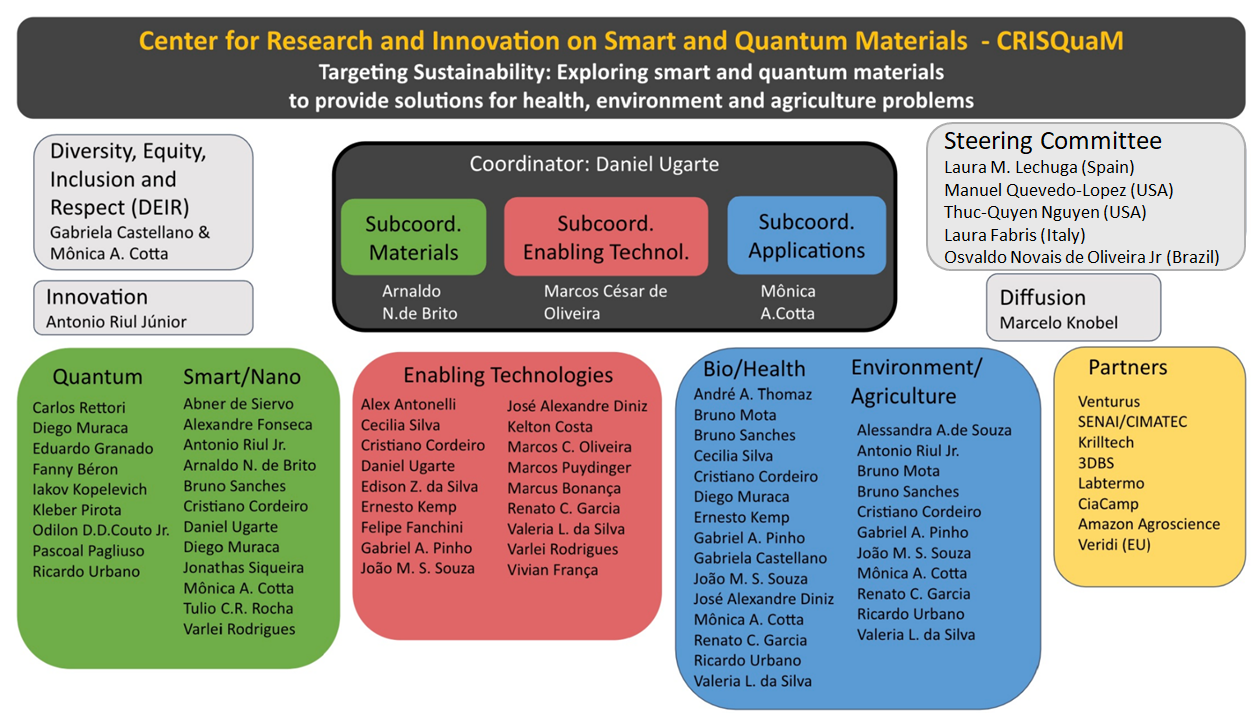BV-FAPESP: research projects supported in this Center
CRISQuaM in the Media: news about the center
CRISQuaM aims to explore the synergistic development of fundamental and applied science to create new materials with high potential for the construction of devices and sensors to address technological challenges related to sustainability, climate change, precision agriculture, ecology, and health. To achieve these goals, we have assembled an interdisciplinary and collaborative research team, integrating expertise across various scientific domains, researching novel materials with high innovation potential. By combining original synthesis methods, advanced characterization techniques, theoretical approaches, computational simulations, quantum technologies, and device construction designs, we aim to drive advances in smart and quantum materials, promoting scientific excellence and technological development. With this, we plan disruptive innovations in instrumentation—including hardware and AI-based tools—as well as in quantum technologies, biomedical devices, and signal processing, in addition to plant bionics, exploring plant-pathogen interactions. Besides research activities, we plan intensive actions in education, dissemination, and communication for the general public, as a modern society should be aware of the challenges humanity faces and how research and technology are essential for responsibly utilizing the planet's limited resources. CRISQuaM's Innovation activities are accelerated through partnerships with several companies in related technologies, many of them Brazilian. Finally, all activities of the Center are managed in accordance with diversity, equity, and inclusion goals and best practices.
The Center brings together scientists, engineers, and innovators in a collaborative effort to apply materials science and quantum technologies at the cutting edge, designing new materials and nano(bio)sensors for advanced diagnostics. The Center has a team capable of producing a wide range of (nano/micro) materials, along with precise chemical and physical characterizations using modern techniques (synchrotron, advanced microscopy, magnetotransport, magnetic resonance, optics, etc.). In addition, the team offers various options in enabling technologies, including miniaturization, processing, and additive manufacturing, as well as instrumentation, quantum sensing, and electronics development. Data analysis will employ updated approaches (numerical simulation, classical and quantum machine learning, and quantum optimization). Applications at the knowledge frontier will address urgent sustainability needs in environmental areas, precision agriculture, plant bionics, and biomedical interfaces, contributing to the development of local technologies in close partnership with the Brazilian industry.
The organization of the Center is based on three pillars — Materials, Enabling Technologies, and Applications — together with partner companies, as described in the figure below.

2023-11-01
A study compared geographical and socioeconomic dimensions of the disease in São Paulo and the Barretos region. Incidence was far higher in the former but mortality rates were similar, suggesting overdiagnosis in specific areas and social groups.
2023-10-25
Researchers at the Federal University of São Paulo analyzed allegedly biodegradable plastic items sold by 40 supermarkets and found most to be oxo-degradables, banned in several countries because they contribute significantly to microplastic pollution. Bills currently before Brazil’s Congress would regulate the sale of such products.
2023-10-25
A study conducted in sustainable-use reserves shows that local game species become less abundant about 5 kilometers away from the nearest human community, but the negative effects of anthropic activity can be mitigated by appropriate management strategies.
2023-10-25
In nematode worms exposed to a compound secreted by pathogenic bacteria, researchers observed activation of a neural circuit resulting in a longer lifespan and less protein aggregation, one of the causes of neurodegenerative diseases. The discovery paves the way for the development of treatments for age-related diseases.
2023-10-25
Brazilian researchers showed that brain activity of Ndel1, an enzyme that plays an important role in neuron differentiation and migration, decreased in mice infected by zika during pregnancy. The enzyme could become a biomarker for early diagnosis of the congenital syndrome associated with zika.
2023-10-25
The product, which contains the anti-inflammatory protein annexin A1, accelerated complete skin wound healing in mice, and has the potential to become part of the arsenal of treatments for a disease that affects 17.7 million Brazilians.
2023-10-18
Opened in 2022 with FAPESP’s support, Nutera is Latin America’s first cellular product manufacturing plant. It is run by researchers from Butantan Institute and the University of São Paulo’s Ribeirão Preto Blood Center, and could become a supplier to the SUS, Brazil’s public healthcare network.
2023-10-18
This is one of the findings of a study led by Brazilian scientists and reported in the science journal Fire. The researchers built a model based on images from the SENTINEL-2 satellite and were able to detect burned areas much more accurately.